Essay for Primary School: Simple Guide for Kids [with Samples]
The age of primary school students ranges from 5 to 11 years. At this stage of education, children start developing their writing skills. They make their first steps to analyzing and proving their points of view. Besides, they study how to write an essay for elementary school.
Correctly preparing all types of homework, from creative to persuasive writing, is something they should learn how to do. Surely, they need assistance in completing the first tasks. Right now, we will present to you the essentials of a good essay for primary school:
- A captivating topic;
- A precise and clear thesis statement;
- Several introductory sentences;
- Several supporting sentences;
- A strong concluding part.
If now you are looking for some hints for writing primary school essays, you have come to the right place. Especially considering the fact that children may approach the task in a variety of ways depending on how they prefer to study (which is easy to find out by taking a learning style quiz for kids). Below, our team has prepared tips and tricks for kids to nail their primary-level academic papers.

💡 How to Write an Essay for Primary School
An essay is one of the first written assignments you may get. So, we advise you to pay special attention to what your teacher says. Before assigning such a task, they give you explanations for preparing a primary school essay.
Usually, elementary school essays are meant to fire up kids’ imagination and expose their writing skills. No matter what the purpose is, you should approach the task with care.
What should an essay for primary school include?
- A captivating topic ; Selecting a topic is the first thing you will do after you get your assignment. Carefully examine the task’s details and think about something appropriate for your elementary level. Brainstorming your ideas is an excellent place to start.
- A precise and clear thesis statement; Make sure your thesis statement is accurate and brief. Without a clear thesis, your essay will not have a central idea and will be hard to develop. A precise statement tells the reader what your writing is about. Besides, it exposes how good your grip on the central idea is.
- Several introductory sentences; A great introductory paragraph can help you grab your readers’ attention. You can start by including a quote, telling an anecdote, or asking a question. In the introduction, the author also identifies the purpose of the essay and the topic. The paragraph ends with a thesis statement and prepares the reader for the supporting sentences.
- Several supporting sentences; This part of your essay will include the position you presented in the thesis statement. It will either offer an idea or defend it. It can be done in several ways: you can include reasons, examples, and supporting points.
- A strong concluding part. The conclusion wraps up the essay, but it emphasizes all the principal points you have argued throughout your essay. It is the last chance to sway your reader by explaining why the topic is relevant to them. Ending your essay with a strong concluding part shows that the thesis statement has been defended.
Essays for primary schools do not require research or analytical data. All you need is to present your ideas on the specified or chosen topic. Mind the proverb, “the written word remains” while writing your first elementary level essay.
The thing is:
The essay structure explained above will work for assignment kids will face in elementary school, middle school, high school, and up to college level. Teaching kids to write a traditional five-paragraph essay is essential for their academic success. It helps explain to them how to argue their ideas in a coherent and structured manner.
If you need more help with writing essays or with essay proofreading , you are welcome at our site.
✨ Topics for Primary School Essays
See the primary school essay topics that are manageable for an elementary level. It should be interesting for a kid but also informative and engaging for the readers.
These topics will get an A+ for your next school assignment:
- Our world in 50 years;
- My first day at school ;
- Future profession;
- My summer holidays ;
- My family ;
- My journey through primary school ;
- When I grow up… etc.…
You can find a good topic but have no idea how to write a good paper on it. These five essay prompts can be helpful if you need some inspiration.
- What is your favorite day of the week, and why? Think about a day of the week you enjoy the most. Why do you like it? Most of us wait for weekends to rest and spend time outside and with our families and friends. If that’s your case, describe how your usual Sunday looks and explain why you enjoy it.
- What do you like the most about winter ? This is another great topic to consider, especially for creative writing. Everyone can pick at least several things they enjoy about winter. Whether it’s the snow, the winter sports, the holidays, or the winter break, write about something you like. It’s a fun and engaging topic for everyone.
- Who’s your hero ? All of us have a person they admire. It can be your father, your friend, or a celebrity. Think about the qualities or their actions that make them so special. You can try to tell a little bit about their biography and explain how they influenced you.
- What’s a good friend? You probably have a best friend. In this essay, you can try to explain what qualities do you personally appreciate in them. If you haven’t found a best friend yet, you can try to think about what kind of people you enjoy interacting with.
- Your biggest dream . People are born with the ability to dream. What is your biggest dream? Is it to learn how to drive a boat or visit savanna and see the big five? This essay lets your imagination and your creativity run wild.
- The car I dream about .
- Explain what friendship means to you.
- Describe your parents.
- How do you understand happiness ?
- Write how you help your classmates with autism to feel included.
- The most important event of my childhood.
- Discuss why physical activity is important for children and what types of activity you like best.
- Do you like to take part in competitive sports ?
- Explain why you like or don’t like figure skating .
- A person who inspires me: my mother .
- What dog would you like to have?
- Describe your visit to Disneyland or any other theme park.
- My travel to Dresden.
- What challenges did you face in primary school ?
- Do you believe in online-friendship?
- What do you do when you feel stressed?
- Tell about your puppy and how you take care of it.
- The reasons my teacher is the brightest figure in my life.
- Describe the kindergarten you went to and explain why you liked or didn’t like it.
- How did you deal with bullies in the kindergarten .
- How I won the fight by losing it .
- Write about your favorite primary school teacher.
- Why everyone should have a pet .
- Explain how you interact with other kids at school.
- Tell about the most exciting event in your life.
- Explore how eating healthy food can help you to do better at school.
- Describe your first visit to a museum .
- The difference of being a child in the past and today .
- Write about your trip to Yellowstone National Park and what you liked the most about it.
- What makes a good parent ?
- How does your dream home look like?
- Do you remember what difficulties you faced while learning to write?
- Tell about your favorite holiday .
- What do you like about Christmas ?
- How I learned to ride a bicycle.
- Describe the lessons you have in primary school and which of them is your favorite.
- Write about your physical education teacher .
- Discuss the pre-school education facility you’ve visited.
Sometimes such prompts can help you better than primary school essay writing samples. First of all, it gives you a direction by leaving you with the questions that only you can answer. Second, it shows you a variety of topics and themes available. Nevertheless, we still encourage you to look at some simple essays for primary school for better results.
All in all:
Essays are the most common academic paper that might seem easy to a writer. Our free tips will help you to get through any kind of paper. Still, if you are stuck on essay writing, you can always ask us for help!
Thank you for reading the article! Share it with peers and leave a comment below to let us know your opinion.
Further reading:
- Essay Topics for Grade 8, 9, 10, 12
- What Does an Excellent Essay Look Like?
- 1000-Word Essays: Quick Answers
- Breaking Down the Types of Essays
- A Complete Guide to Essay Writing
- How to Write a Good 5 Paragraph Essay
- The Basics of Effective Essay Writing: Becton Loveless, Education Corner
- 50 Writing Prompts for Elementary School Children: Janelle Cox, ThoughtCo
- Student Writing Models: Thoughtful Learning K-12
- Elementary Archives: JournalBuddies.com
- Share to Facebook
- Share to Twitter
- Share to LinkedIn
- Share to email

Canadian identity is something that has become really important for many Canadians in the past fifty years. Canada is a big, multinational country with its own traditions, culture, and history. However, because of quite a large number of foreigners and even Americans, its culture and people are associated with the...

Let’s say you received a task to write an essay about cars. The topic might be interesting for you, but you may still have no idea how to organize your paper. Well, this article is for you.

Smoking can be viewed as one of the trendy habits. Numerous teenagers try it since they think that it is cool or can help them socialize. Often students start smoking due to stress or mental illnesses. But is it okay? Educators tend to give different written assignments, which may disclose...
![essay for primary school Child Labor Essay: Thesis, Examples, & Writing Guide [2024]](https://custom-writing.org/blog/wp-content/uploads/2020/12/child-working-in-cambodia-e1565628499749-284x153.jpg)
Children have always been apprentices and servants all over human history. However, the Industrial Revolution increased the use of child labor in the world. It became a global problem that is relevant even today when such employment is illegal.
![essay for primary school French Essay: Topics, Tips, and Examples [2024 Updated]](https://custom-writing.org/blog/wp-content/uploads/2020/12/french-woman-with-baguettes-street-beret-284x153.jpg)
Nowadays, knowing several foreign languages is no longer surprising. For example, learning French is common for English-speaking countries. So, getting an assignment on this subject won’t be a surprise for a student.

Dissertation critique writing develops the students’ critical and logical thinking abilities. When composing, the students learn to analyze the works conducted by other researchers. To critique a dissertation, you should: Thoroughly read the paper.Take notes and summarize the text (you can even try and use auto summarizer for that).Interpret and...

An opinion essay is a formal piece of writing which presents the author’s point of view on a particular subject supported by reasoning and examples. The opposing viewpoint is also suggested, but it is followed by arguments that show its inconsistency. Take a look at the guide prepared by Custom-writing experts to...

So, you need to accomplish your discursive essay writing. The typical questions most students ask are: How do you write it? What is discursive essay? A discursive essay is an academic paper that involves a discussion on a particular topic. It is usually assigned to college students. You may be...

How to write a narrative essay? To do that, you need to know what a narrative essay is. It is an academic text usually written as a story and containing all the usual elements of a story. Narrative essays are often personal, experiential, and creative. Still, they should be made...
![essay for primary school College Essay Writing 101—the Comprehensive Guide [2024]](https://custom-writing.org/blog/wp-content/uploads/2021/01/student-girl-making-notes-in-a-copybook-with-a-pencil-e1565634333206-284x153.png)
So, you can’t wait to get into college and join a fraternity, sorority, or student union. Well, we have some incredibly useful tips and helpful information for college admission essay writing! Remember: getting into college takes more than money. And outstanding essays get you great college scholarships!
![essay for primary school Americanism Essay: Examples, Tips & Topics [2024 Update]](https://custom-writing.org/blog/wp-content/uploads/2020/12/american-flag-284x153.jpg)
It’s not hard to see why Americanism is one of the most popular essay topics. The concept of Americanism is in the center of the US identity. Writing an essay about it is an excellent way to find out more about this great country.

An art critique paper involves a comprehensive analysis and assessment of an artwork. Though this looks a bit complicated, the task doesn’t require a lot of time if you have sufficient critique writing skills. It’s an interesting assignment for students of art colleges as well as high schoolers. All you...
Being a primary school teacher of English language, I have discovered that many students leave primary school without basic essay writing skills. This is because as teachers, we do less to help and guide the learners in this aspect. We do less because we lack the knowledge and ability to guide the learners perfect this writing skills yet it is considered the production stage of language learning. Kindly help me. Guide me further so that I can also guide my learners.
A great suggestion for primary teachers and parents!
This is a very good method to preach the acknowledgments on report writing towards people.
Thank you for your great effort and help. Your blog has taught me many things! Thanks for this fantastic blog post on writing primary school essays.
Thanks for the post on writing essays for primary schools. It’s a real help for me and my son, who just starts to learn how to write essays.
How to write a perfect essay
Need to write an essay? Does the assignment feel as big as climbing Mount Everest? Fear not. You’re up to the challenge! The following step-by step tips from the Nat Geo Kids Almanac will help you with this monumental task.
Sometimes the subject matter of your essay is assigned to you, sometimes it’s not. Either way, you have to decide what you want to say. Start by brainstorming some ideas, writing down any thoughts you have about the subject. Then read over everything you’ve come up with and consider which idea you think is the strongest. Ask yourself what you want to write about the most. Keep in mind the goal of your essay. Can you achieve the goal of the assignment with this topic? If so, you’re good to go.
WRITE A TOPIC SENTENCE
This is the main idea of your essay, a statement of your thoughts on the subject. Again, consider the goal of your essay. Think of the topic sentence as an introduction that tells your reader what the rest of your essay will be about.
OUTLINE YOUR IDEAS
Once you have a good topic sentence, you then need to support that main idea with more detailed information, facts, thoughts, and examples. These supporting points answer one question about your topic sentence—“Why?” This is where research and perhaps more brainstorming come in. Then organize these points in the way you think makes the most sense, probably in order of importance. Now you have an outline for your essay.
ON YOUR MARK, GET SET, WRITE!
Follow your outline, using each of your supporting points as the topic sentence of its own paragraph. Use descriptive words to get your ideas across to the reader. Go into detail, using specific information to tell your story or make your point. Stay on track, making sure that everything you include is somehow related to the main idea of your essay. Use transitions to make your writing flow.
Finish your essay with a conclusion that summarizes your entire essay and 5 restates your main idea.
PROOFREAD AND REVISE
Check for errors in spelling, capitalization, punctuation, and grammar. Look for ways to make your writing clear, understandable, and interesting. Use descriptive verbs, adjectives, or adverbs when possible. It also helps to have someone else read your work to point out things you might have missed. Then make the necessary corrections and changes in a second draft. Repeat this revision process once more to make your final draft as good as you can.
Download the pdf .
Homework help
Science lab, (ad) national geographic kids almanac.
- Terms of Use
- Privacy Policy
- Your California Privacy Rights
- Children's Online Privacy Policy
- Interest-Based Ads
- About Nielsen Measurement
- Do Not Sell My Info
- National Geographic
- National Geographic Education
- Shop Nat Geo
- Customer Service
- Manage Your Subscription
Copyright © 1996-2015 National Geographic Society Copyright © 2015-2024 National Geographic Partners, LLC. All rights reserved

Essay Writing: A complete guide for students and teachers
P LANNING, PARAGRAPHING AND POLISHING: FINE-TUNING THE PERFECT ESSAY
Essay writing is an essential skill for every student. Whether writing a particular academic essay (such as persuasive, narrative, descriptive, or expository) or a timed exam essay, the key to getting good at writing is to write. Creating opportunities for our students to engage in extended writing activities will go a long way to helping them improve their skills as scribes.
But, putting the hours in alone will not be enough to attain the highest levels in essay writing. Practice must be meaningful. Once students have a broad overview of how to structure the various types of essays, they are ready to narrow in on the minor details that will enable them to fine-tune their work as a lean vehicle of their thoughts and ideas.

In this article, we will drill down to some aspects that will assist students in taking their essay writing skills up a notch. Many ideas and activities can be integrated into broader lesson plans based on essay writing. Often, though, they will work effectively in isolation – just as athletes isolate physical movements to drill that are relevant to their sport. When these movements become second nature, they can be repeated naturally in the context of the game or in our case, the writing of the essay.
THE ULTIMATE NONFICTION WRITING TEACHING RESOURCE

- 270 pages of the most effective teaching strategies
- 50+ digital tools ready right out of the box
- 75 editable resources for student differentiation
- Loads of tricks and tips to add to your teaching tool bag
- All explanations are reinforced with concrete examples.
- Links to high-quality video tutorials
- Clear objectives easy to match to the demands of your curriculum
Planning an essay

The Boys Scouts’ motto is famously ‘Be Prepared’. It’s a solid motto that can be applied to most aspects of life; essay writing is no different. Given the purpose of an essay is generally to present a logical and reasoned argument, investing time in organising arguments, ideas, and structure would seem to be time well spent.
Given that essays can take a wide range of forms and that we all have our own individual approaches to writing, it stands to reason that there will be no single best approach to the planning stage of essay writing. That said, there are several helpful hints and techniques we can share with our students to help them wrestle their ideas into a writable form. Let’s take a look at a few of the best of these:
BREAK THE QUESTION DOWN: UNDERSTAND YOUR ESSAY TOPIC.
Whether students are tackling an assignment that you have set for them in class or responding to an essay prompt in an exam situation, they should get into the habit of analyzing the nature of the task. To do this, they should unravel the question’s meaning or prompt. Students can practice this in class by responding to various essay titles, questions, and prompts, thereby gaining valuable experience breaking these down.
Have students work in groups to underline and dissect the keywords and phrases and discuss what exactly is being asked of them in the task. Are they being asked to discuss, describe, persuade, or explain? Understanding the exact nature of the task is crucial before going any further in the planning process, never mind the writing process .
BRAINSTORM AND MIND MAP WHAT YOU KNOW:
Once students have understood what the essay task asks them, they should consider what they know about the topic and, often, how they feel about it. When teaching essay writing, we so often emphasize that it is about expressing our opinions on things, but for our younger students what they think about something isn’t always obvious, even to themselves.
Brainstorming and mind-mapping what they know about a topic offers them an opportunity to uncover not just what they already know about a topic, but also gives them a chance to reveal to themselves what they think about the topic. This will help guide them in structuring their research and, later, the essay they will write . When writing an essay in an exam context, this may be the only ‘research’ the student can undertake before the writing, so practicing this will be even more important.
RESEARCH YOUR ESSAY
The previous step above should reveal to students the general direction their research will take. With the ubiquitousness of the internet, gone are the days of students relying on a single well-thumbed encyclopaedia from the school library as their sole authoritative source in their essay. If anything, the real problem for our students today is narrowing down their sources to a manageable number. Students should use the information from the previous step to help here. At this stage, it is important that they:
● Ensure the research material is directly relevant to the essay task
● Record in detail the sources of the information that they will use in their essay
● Engage with the material personally by asking questions and challenging their own biases
● Identify the key points that will be made in their essay
● Group ideas, counterarguments, and opinions together
● Identify the overarching argument they will make in their own essay.
Once these stages have been completed the student is ready to organise their points into a logical order.
WRITING YOUR ESSAY
There are a number of ways for students to organize their points in preparation for writing. They can use graphic organizers , post-it notes, or any number of available writing apps. The important thing for them to consider here is that their points should follow a logical progression. This progression of their argument will be expressed in the form of body paragraphs that will inform the structure of their finished essay.
The number of paragraphs contained in an essay will depend on a number of factors such as word limits, time limits, the complexity of the question etc. Regardless of the essay’s length, students should ensure their essay follows the Rule of Three in that every essay they write contains an introduction, body paragraphs, and a conclusion.
Generally speaking, essay paragraphs will focus on one main idea that is usually expressed in a topic sentence that is followed by a series of supporting sentences that bolster that main idea. The first and final sentences are of the most significance here with the first sentence of a paragraph making the point to the reader and the final sentence of the paragraph making the overall relevance to the essay’s argument crystal clear.
Though students will most likely be familiar with the broad generic structure of essays, it is worth investing time to ensure they have a clear conception of how each part of the essay works, that is, of the exact nature of the task it performs. Let’s review:
Common Essay Structure
Introduction: Provides the reader with context for the essay. It states the broad argument that the essay will make and informs the reader of the writer’s general perspective and approach to the question.
Body Paragraphs: These are the ‘meat’ of the essay and lay out the argument stated in the introduction point by point with supporting evidence.
Conclusion: Usually, the conclusion will restate the central argument while summarising the essay’s main supporting reasons before linking everything back to the original question.
ESSAY WRITING PARAGRAPH WRITING TIPS

● Each paragraph should focus on a single main idea
● Paragraphs should follow a logical sequence; students should group similar ideas together to avoid incoherence
● Paragraphs should be denoted consistently; students should choose either to indent or skip a line
● Transition words and phrases such as alternatively , consequently , in contrast should be used to give flow and provide a bridge between paragraphs.
HOW TO EDIT AN ESSAY

Students shouldn’t expect their essays to emerge from the writing process perfectly formed. Except in exam situations and the like, thorough editing is an essential aspect in the writing process.
Often, students struggle with this aspect of the process the most. After spending hours of effort on planning, research, and writing the first draft, students can be reluctant to go back over the same terrain they have so recently travelled. It is important at this point to give them some helpful guidelines to help them to know what to look out for. The following tips will provide just such help:
One Piece at a Time: There is a lot to look out for in the editing process and often students overlook aspects as they try to juggle too many balls during the process. One effective strategy to combat this is for students to perform a number of rounds of editing with each focusing on a different aspect. For example, the first round could focus on content, the second round on looking out for word repetition (use a thesaurus to help here), with the third attending to spelling and grammar.
Sum It Up: When reviewing the paragraphs they have written, a good starting point is for students to read each paragraph and attempt to sum up its main point in a single line. If this is not possible, their readers will most likely have difficulty following their train of thought too and the paragraph needs to be overhauled.
Let It Breathe: When possible, encourage students to allow some time for their essay to ‘breathe’ before returning to it for editing purposes. This may require some skilful time management on the part of the student, for example, a student rush-writing the night before the deadline does not lend itself to effective editing. Fresh eyes are one of the sharpest tools in the writer’s toolbox.
Read It Aloud: This time-tested editing method is a great way for students to identify mistakes and typos in their work. We tend to read things more slowly when reading aloud giving us the time to spot errors. Also, when we read silently our minds can often fill in the gaps or gloss over the mistakes that will become apparent when we read out loud.
Phone a Friend: Peer editing is another great way to identify errors that our brains may miss when reading our own work. Encourage students to partner up for a little ‘you scratch my back, I scratch yours’.
Use Tech Tools: We need to ensure our students have the mental tools to edit their own work and for this they will need a good grasp of English grammar and punctuation. However, there are also a wealth of tech tools such as spellcheck and grammar checks that can offer a great once-over option to catch anything students may have missed in earlier editing rounds.

Putting the Jewels on Display: While some struggle to edit, others struggle to let go. There comes a point when it is time for students to release their work to the reader. They must learn to relinquish control after the creation is complete. This will be much easier to achieve if the student feels that they have done everything in their control to ensure their essay is representative of the best of their abilities and if they have followed the advice here, they should be confident they have done so.
WRITING CHECKLISTS FOR ALL TEXT TYPES

⭐⭐⭐⭐⭐ (92 Reviews)
ESSAY WRITING video tutorials

- Grades 6-12
- School Leaders
Enter Today's Teacher Appreciation Giveaway!
100 Thought-Provoking Argumentative Writing Prompts for Kids and Teens
Practice making well-reasoned arguments using research and facts.
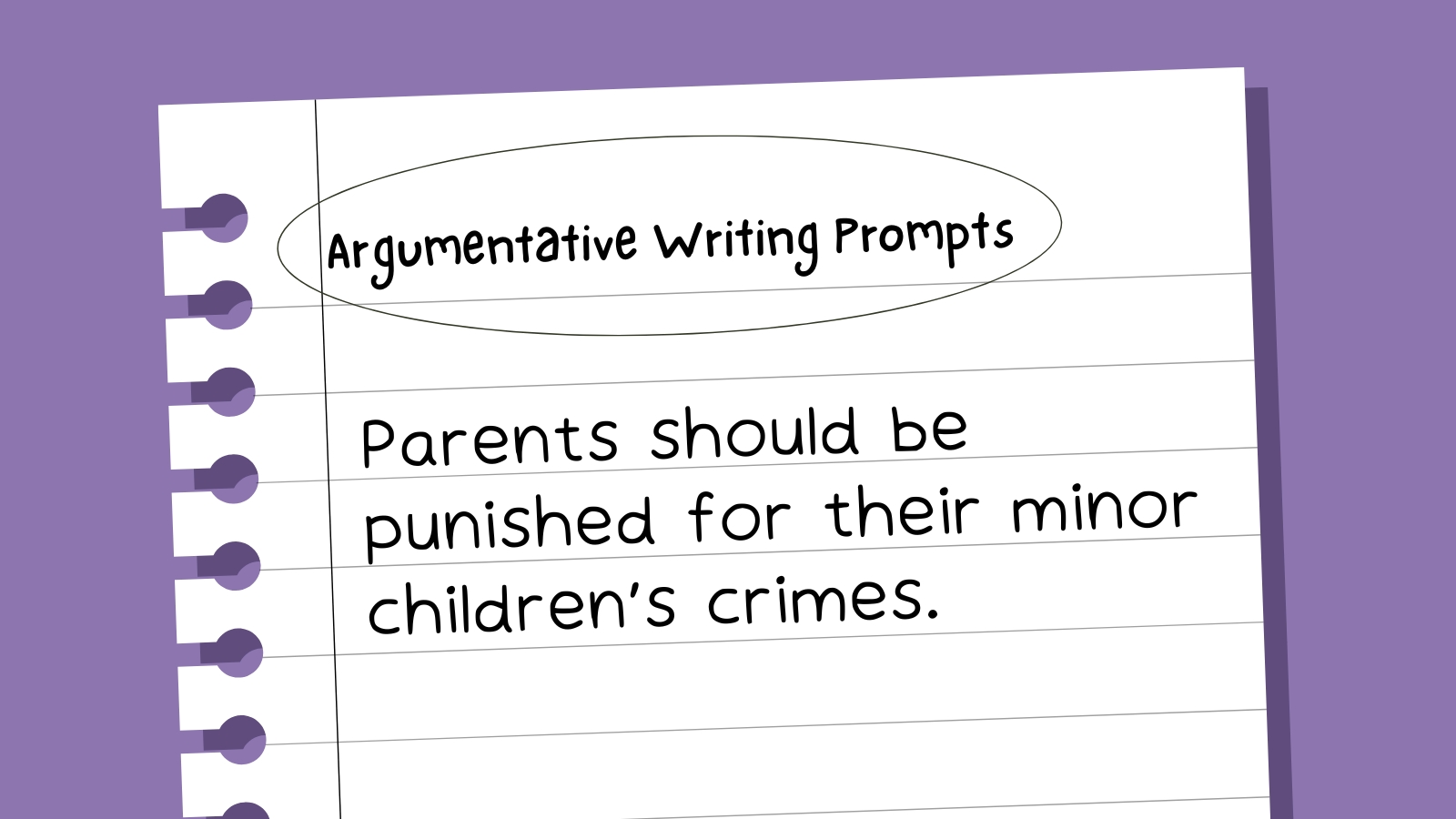
Writing a strong argumentative essay teaches students to make a case for their own point of view without relying on emotion or passion. These argumentative essay topics provide options for kids of all ages, including controversial subjects and some that are just for fun.
School and Education Argumentative Essay Topics
Science and history argumentative essay topics, life and ethics argumentative essay topics, social justice and civics argumentative essay topics, more argumentative essay topics, what’s the difference between argumentative and persuasive essays.
These two types of essays are similar, but there are some subtle and important differences .
- Author’s purpose: In an argumentative essay, your job is to simply convince the reader that the point of view you’re presenting is valid, even if it doesn’t change their mind. Persuasive essays seek to sway the reader to adopt your point of view over any others.
- Method: Argumentative essays rely heavily on well-researched facts and logical assertions. In a persuasive essay, the writer may use a blend of emotion and facts to win over the reader.
- Audience: Persuasive essays require a specific audience, since the writer must acknowledge and attempt to overcome their potential objections. The writer of an argumentative essay is simply making a statement, so knowing their audience is less important.
- Viewpoint: A persuasive essay writer should believe their point of view is the only correct one, and try to persuade the reader to agree. Argumentative essays acknowledge other points of view, but use reason and logic to argue that the writer’s point of view is best.
Persuasive and argumentative essay topics often overlap. The difference is in how the writer approaches the topic. When you assign one of the topics below as an argumentative essay, remind students to use research, reason, and logic to make a strong but dispassionate argument.
- Should physical education be part of the standard high school curriculum?
- Schools should require recommended vaccines for all students, with very limited exceptions.
- Should all students have the ability to attend college for free?
- What one class should all high schools students be required to take and pass in order to graduate?

- Do you think homework should be required, optional, or not given at all?
- Students should/should not be able to use their phones during the school day.
- Should schools have dress codes?
- If I could change one school rule, it would be …
- Is year-round school a good idea?
- Which is better, private schools or public schools?
- Should every student have to participate in athletics?
- Do you think schools should ban junk food from their cafeterias?
- Should students be required to volunteer in their communities?
- What is the most important school subject?
- Are letter grades helpful, or should we replace them with something else?
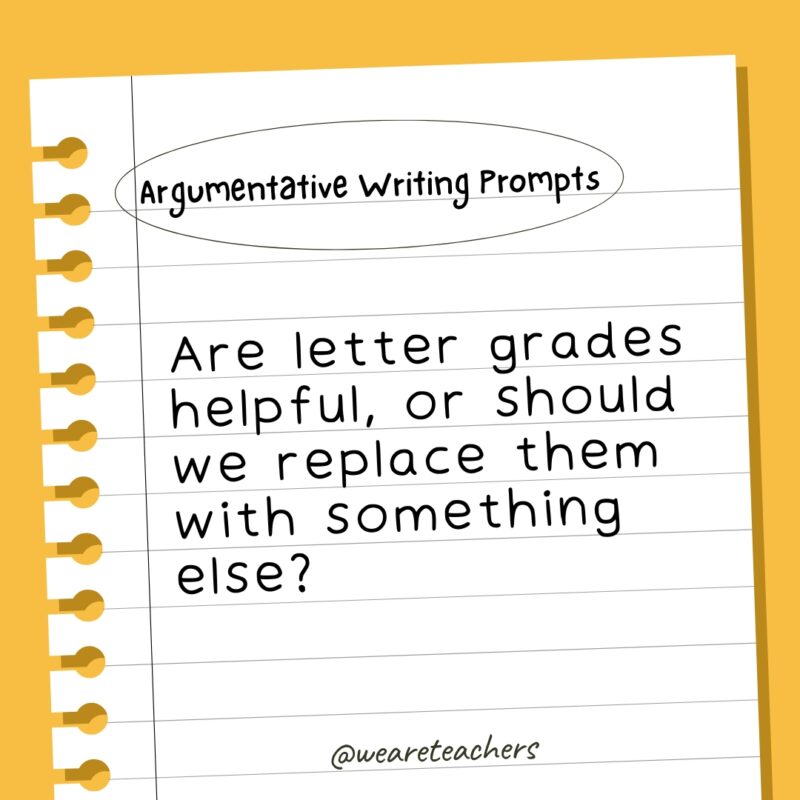
- Should schools be allowed to ban some books from their libraries?
- Which is better, book smarts or street smarts?
- Are single-gender schools better or worse for students?
- Are computers making teachers obsolete?
- Students who fail a test should be given a chance to take it again.
- Is it acceptable to use animals for experiments and research?
- Vaping is less harmful than smoking tobacco.
- Do we really learn anything from history, or does it just repeat itself over and over?
- Is it OK to keep animals in zoos?
- Should we ban plastic bags and bottles?
- Should we still consider Pluto a planet?

- It’s important to spend tax dollars exploring space, instead of on other things.
- Is there life on other planets?
- Who was the best/worst American president?
- Should vaccines be mandatory?
- Are GMOs more helpful than harmful?
- Is animal cloning ethical?
- Should human cloning be legal?
- Should we use stem cells from human embryos for scientific research?
- Is it better to provide drug addicts with treatment instead of punishment?
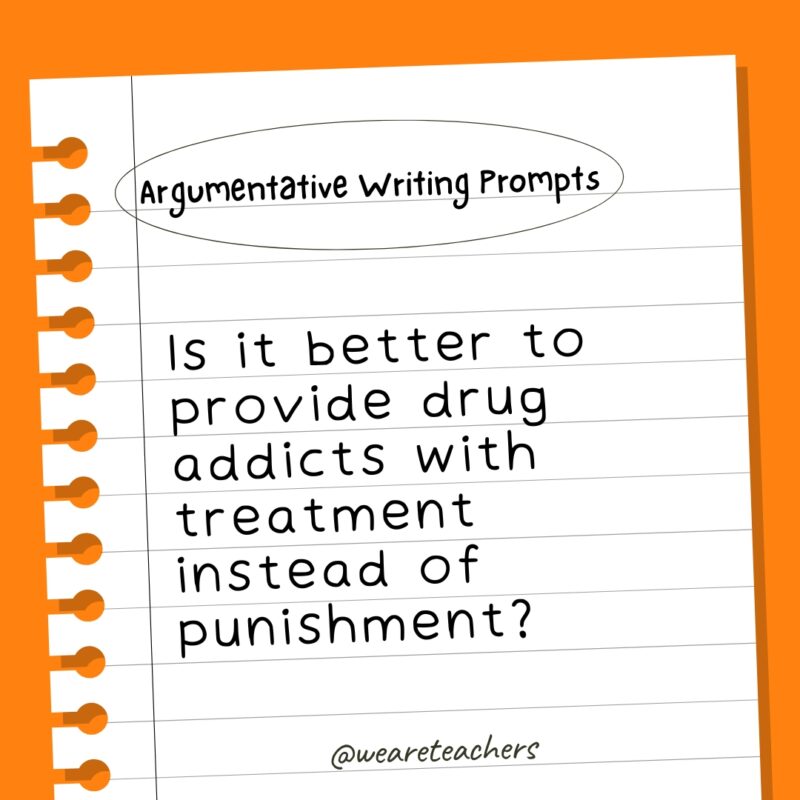
- Should we ban the use of fossil fuels?
- Can we truly do anything about human-caused global warming?
- Are electric vehicles better than gas-powered ones?
- Was life really better “back in the day”?
- Choose a foreign conflict (e.g., Vietnam or Afghanistan) and argue whether or not the United States was justified in getting involved.
- The most important challenge our country is currently facing is … (e.g., immigration, gun control, economy)
- Does social media do more harm than good?
- The best country in the world is …
- Are men and women treated equally?
- Is it better to be vegetarian/vegan than to eat meat?
- Should little kids be allowed to play competitive sports?
- Who faces more peer pressure, girls or boys?
- Should kids have set bedtimes or just go to bed whenever they’re sleepy?
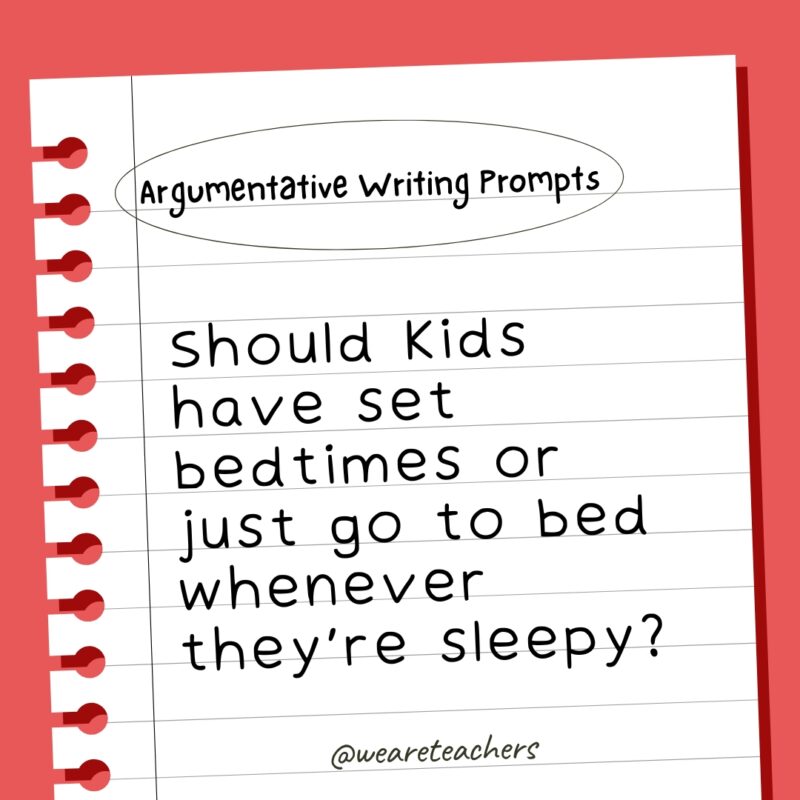
- Which is better, artificial Christmas trees or real ones?
- Playing violent video games is bad for kids and teens.
- Parents should track their kids using their cell phones.
- Are paper books better than e-books?
- All kids should play on the same sports teams, regardless of gender.
- All paper documents should be replaced with electronic versions.
- Is conflict necessary for change?
- Is war ever justified?
- A strong middle class is vital to the economy.
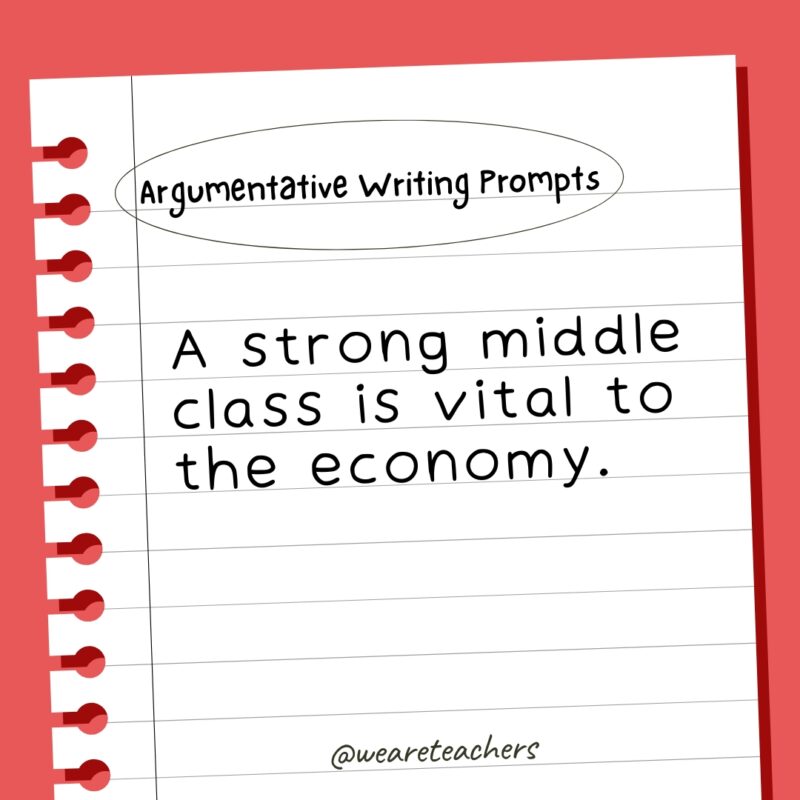
- Is the local minimum wage truly a living wage?
- Should we do away with gender-specific public bathrooms?
- Is a progressive income tax better than a flat tax?
- Capital punishment does/does not deter crime.
- Would it be better to legalize, tax, and regulate all drugs (including alcohol and cigarettes) instead of banning them?
- Parents should be punished for their minor children’s crimes.
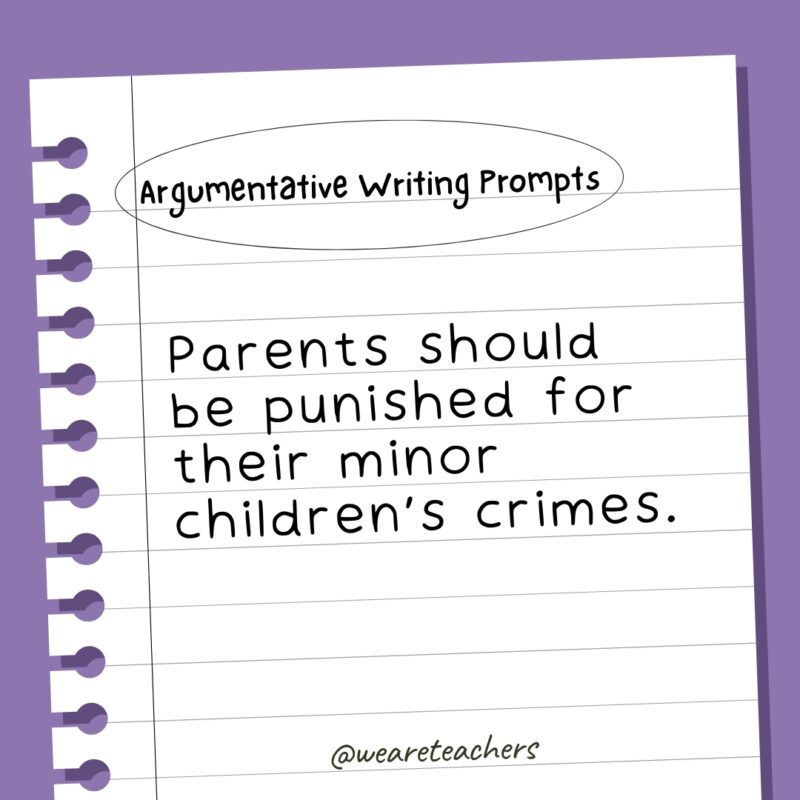
- The government should provide free internet access for every citizen.
- Is democracy the best form of government?
- Is capitalism the best form of economy?
- Should all Americans be required to vote?
- Should we change the minimum driving age in the United States?
- Do you think the government should find a way to provide free health care for everyone?
- School-age children should be allowed to vote.
- We should/should not abolish the electoral college.
- Are “Stand Your Ground” laws effective?
- Supreme Court judges should be appointed for fixed terms.
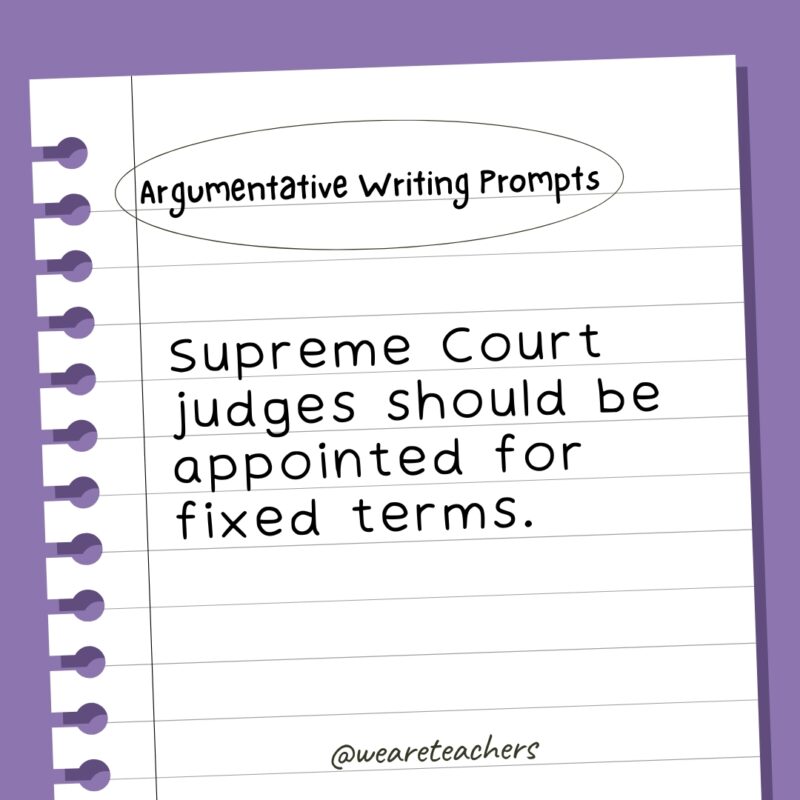
- Does segregation still exist in the United States?
- We should/should not continue building a wall between the United States and Mexico.
- Will stricter gun control laws help control mass shootings?
- Should we make the path to American citizenship easier?
- Is the American justice system inherently racist?
- Should we redirect some or all police force funding to social services?
- Should the United States implement a universal basic income?
- Choose a fictional character and explain why they should be the next president.
- What animal makes the best pet?
- Who is the world’s best athlete, present or past?
- Which is better, reading books or watching TV?
- Is a taco a sandwich?
- Should kids be allowed to stay up as late as they want?
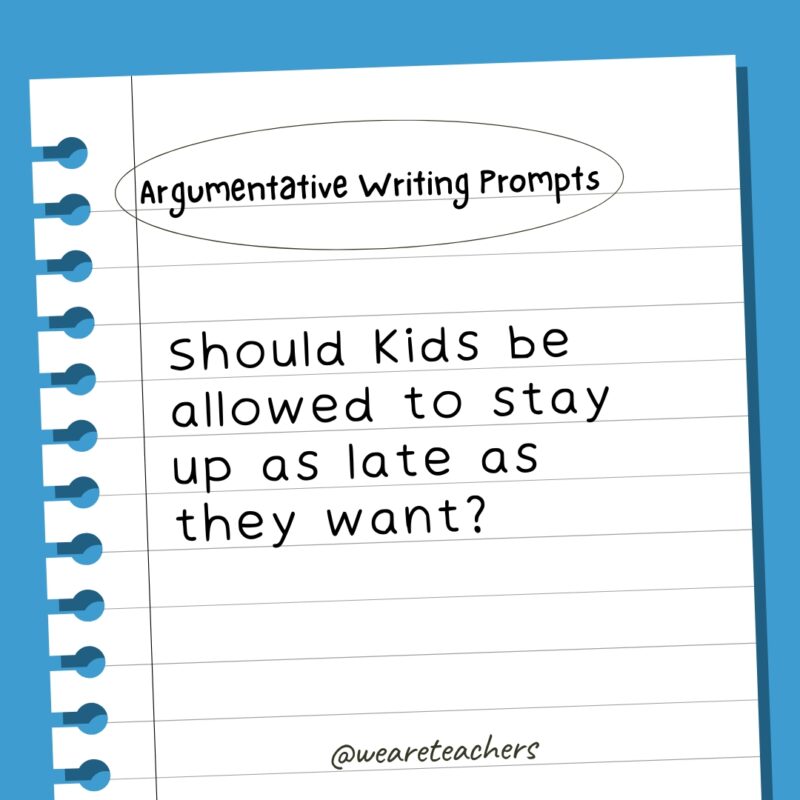
- What’s the best video game system?
- Kids shouldn’t have to go to school on their birthdays.
- Is video gaming a sport?
- Are beauty pageants sexist?
- Should kids get participation trophies for sports?
- Are stereotypes ever right?
- Is there any benefit to teaching proper grammar and spelling, or should we allow language to be descriptive instead of prescriptive?
- All teenagers should have part-time jobs.
- Should kids have limits on screen time?
- Is it better to read fiction or nonfiction?
- Should kids have to eat everything on their plate, even if they really don’t like something?
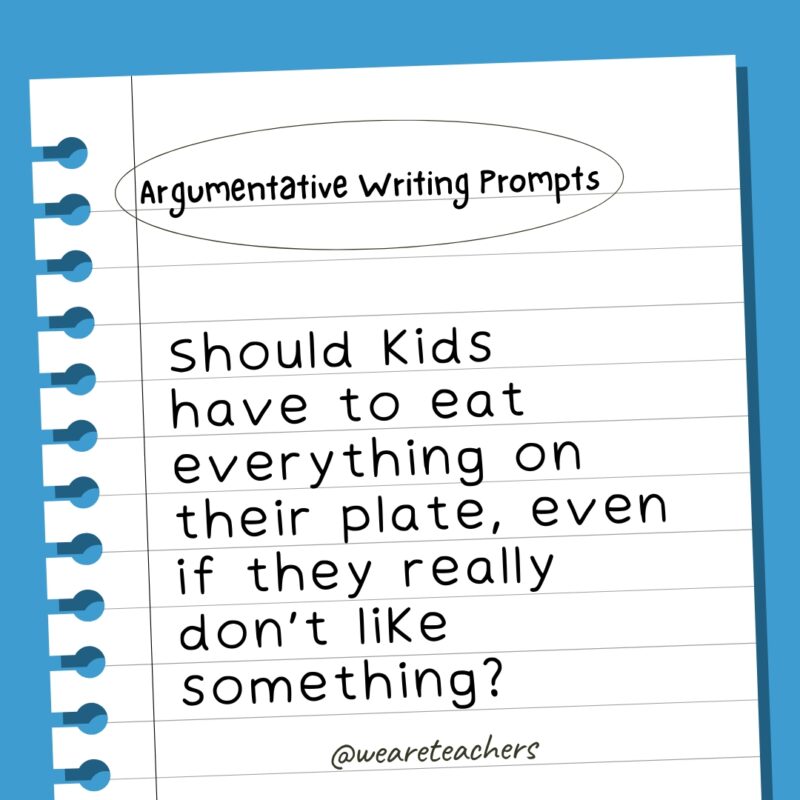
- Is it better to spend an hour a day reading or exercising?
- Is graffiti an act of vandalism or an art form?
- Should society hold celebrities to a high moral standard?
What are your favorite argumentative writing prompts? Come share your thoughts in the WeAreTeachers HELPLINE group on Facebook .
Also check out 100 intriguing cause and effect essay topics for students ..
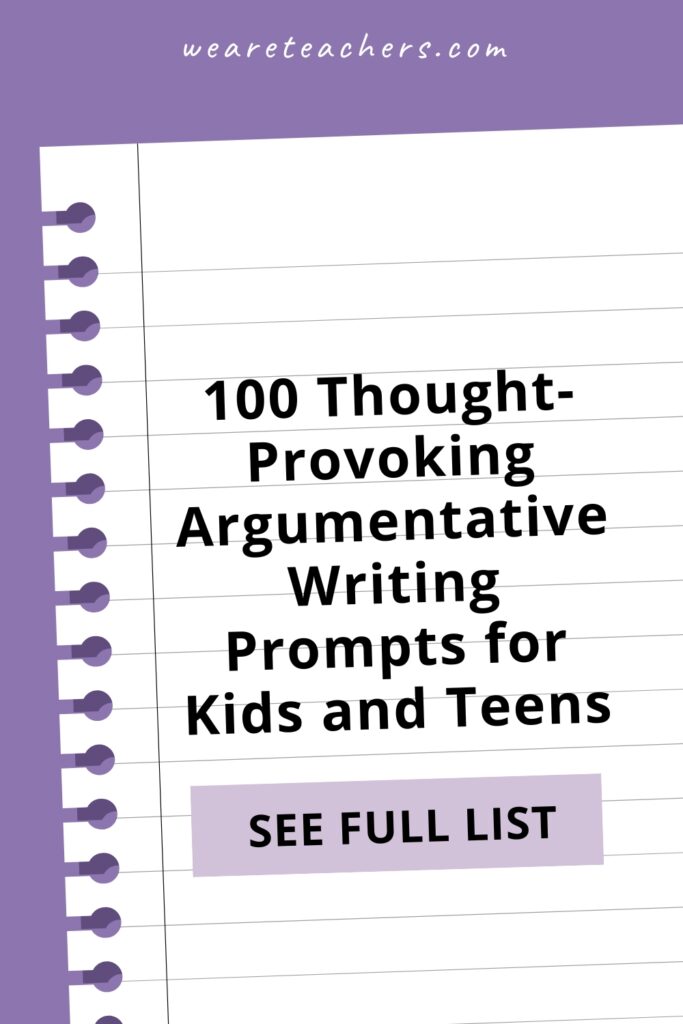
You Might Also Like

The Big List of Essay Topics for High School (120+ Ideas!)
Ideas to inspire every young writer! Continue Reading
Copyright © 2024. All rights reserved. 5335 Gate Parkway, Jacksonville, FL 32256
- Professional development
- Knowing the subject
First steps in essay writing for primary school students
It is often difficult to get young learners closer to understanding the main purpose and development of an opinion essay.

Posted by Karina Castro
This resource could become an easy starting point to help them generate ideas and produce consistent lines. A good source of inspiration is essential for this kind of task. A couple of months ago I found an essay in pictures by Neil Gaiman published in The Guardian. It is part of Gaiman’s larger work Art Matters, and of public access. It explains the importance of reading, libraries preservation and daydreaming.
https://www.theguardian.com/books/gallery/2018/sep/06/neil-gaiman-and-chris-riddell-on-why-we-need-libraries-an-essay-in-pictures?CMP=Share_iOSApp_Other
The use of this material could benefit students both by connecting them with a different kind of literature and encouraging them to write their own ideas on the topic.
1. Start by showing on your classroom screen the different parts of the essay (or print them and paste them all over the classroom). Select students to read them aloud and invite them to make comments and provide their own opinion: Do they agree? What would they add to each sentence? What other ideas would they include?
2. Encourage your students to join in groups and write down their own ideas starting by those of the author. Eg: Reading is important because…; Books are …, etc.
3. Ask students to check grammar and spelling. Help them when necessary.
4. Share their final works.
You may take notes on the board of those sentences whose contents reflect their strongest points of view and guide them to reorder them so that they have a logical connection and result in a clear statement of what they think on the issue.
After that first try, you could encourage your students to write about different topics like:
- Our environment needs our help
- Learning languages is our gate to the world
- A creative mind will always make a free person
You may use any other topic you are working with or they suggest. This time you should let them work on their own: alone, in pairs or in small groups. Make sure they can count on you during the process.
Cross-curricular - Language + Art
As the last step for this task, you could join the Art teacher, who can work with the students to illustrate each of their lines/ideas. The final result would be a real “essay in pictures” which could decórate your classroom, the school’s reception, one of the school’s corridors or, why not, become the central part of the school’s Art Display this year! Give it a try, and writing an opinion essay won’t be that tough (or boring) for your students next time!
Research and insight
Browse fascinating case studies, research papers, publications and books by researchers and ELT experts from around the world.
See our publications, research and insight
Home / Essay Samples / Education / School / Primary School
Primary School Essay Examples
Exploring the emotions and experience of the first day of school.
Do you remember your first day of school? It’s a day that you cannot forget! Specially for me it was delightful, We all have a wonderful journey that is deep inside effecting us, and it begins with a first step that may be the energy...
Inculcation of Values: Physical Education in Class
Physical education is being taught nowadays as a subject in primary schools, which focuses on the development of physical fitness and the ability to perform and enjoy day-to-day physical activities with ease. Learners are likely to participate in consistent, safe, enjoyable and engaging movement and...
Inclusive Education: Evaluation of Qualitative Research Process
The article I will be examining in this piece is “The relationship between school culture and inclusion: How an inclusive culture supports inclusive education” by Nancy J. Zollers. In this piece I will be identifying and examining elements of the qualitative research process. The social...
The Practice in an Elementary School Intermediate Resource Room
This has been an eye-opening three weeks of observations and practicum in an elementary school intermediate resource room. Everything from severe behaviors in students to the simple question of how does a new teacher create a library of books for the classroom without needing an...
My Motivation to Become a Primary Teacher
The sense of achievement that I feel when helping children learn a new concept is what encourages and excites me to become a primary teacher. Having the ability to help younger children to develop into independent and confident learners through creative, fun and positive ways...
Universal Healthcare Coverage in Singapore
This essay shows an overview on the key concept of Universal health coverage (UHC). Universal health coverage means all individuals and communities have access to the healthcare services they need, while being protected from financial burden. It covers a full spectrum of essential, quality health...
Trying to find an excellent essay sample but no results?
Don’t waste your time and get a professional writer to help!
You may also like
- Studying Abroad
- Critical Thinking
- Special Education
- Academic Interests
- Distance Education
- Adult Education Program
- School Ranking Essays
- Elementary School Essays
- School Uniform Essays
- Homeschooling Essays
- High School Essays
- Middle School Essays
- School Curriculums Essays
- Segregation in Schools Essays
- School-To-School Comparison Essays
- Starting School Later Essays
samplius.com uses cookies to offer you the best service possible.By continuing we’ll assume you board with our cookie policy .--> -->